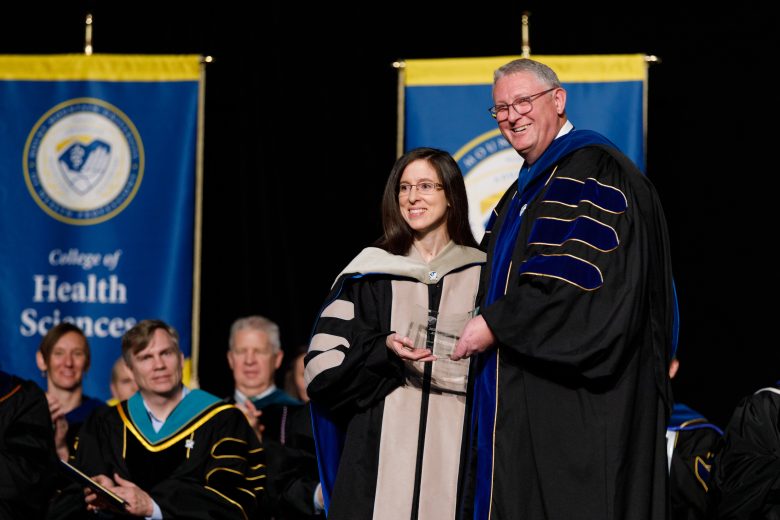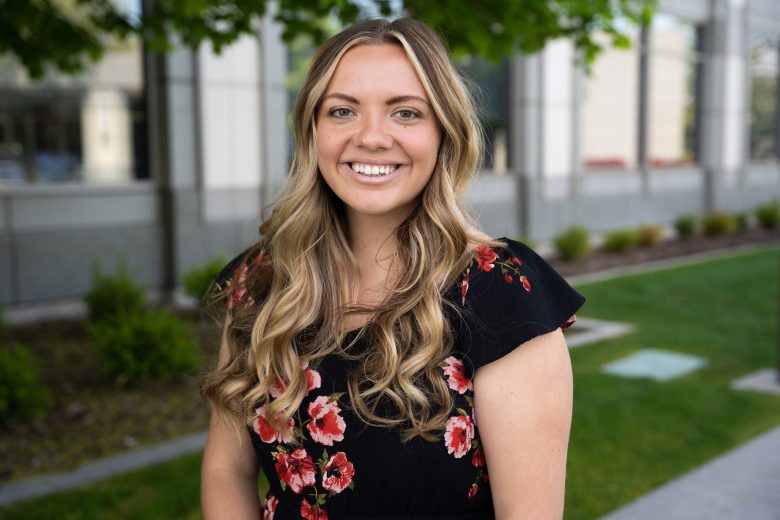
You can learn a lot about Marjorie King, Ph.D., ATC, PT, FACSM, from what she won’t tell you about herself. Candid and clever, the 40-year healthcare veteran has plenty to say, but she’s unlikely to mention her induction into the National Athletic Trainers’ Association Hall of Fame, or elaborate on her role as a Fellow of the American College of Sports Medicine. Frankly, she’d rather talk about her ski team.
That’s right, King, Athletic Training Hall of Famer twice over, accomplished researcher, and sought-after lecturer, prefers to discuss her work with the high school and middle school students of Bartlett, New Hampshire.
“[Working with] these middle and high school kids on the alpine ski team fuels me because I see how little they understand their bodies,” King explains. “I get to catch them before they have their first ACL tear. I get to catch them before they have an impending rotator cuff tear…I think it’s a population that gets dismissed.”
Fortunately, it’s not in King’s nature to dismiss much of anything—or anyone. Name a population demographic, and chances are that she has worked closely with those patients. And after decades spent in clinics, on playing fields, and in classrooms, she’s moved her athletic training and physical therapy practice beyond simply acute injury prevention and rehabilitation.
“There’s much more to sustaining health and creating health than just the body part that broke down. I’ve shifted from the classic pathological medical model being the only component that clinicians need to be considering.” This realization has driven her to refresh her clinical perspective through a focus on integrative medicine.
“Integrative medicine is an approach to the healthcare of an individual where the practitioner chooses to consider the whole person’s health status rather than a specific symptomatic location.” She explains that it’s not as effective “to consider just the body or just the mind and emotions, rather than understanding the integration of mind, body and spirit.”
Her clinical approach reflects innovative research that explores the complex ways that body systems interact to sustain and restore health. She believes that an athlete’s health and recovery depends heavily on their commitment to overall wellness, and integrated medicine is critical to maintaining that wellness.
King studies how seemingly unrelated elements of the human body can have dramatic effects on an athlete’s healing process. “I don’t understand how you could work with an athlete and not talk to them about their gut microbiome,” she explains. “The gut microbiome is going to affect the inflammatory process in the body, and, therefore, its healing.”
Understanding these relationships within the body helps athletes embrace a comprehensive approach to wellness that leads to on-field success. “The gut microbiome has an impact on both physiological as well as mental health. So now you’re talking about influencing performance. This is a point where you can do more than just throw ice and stim on [athletes]. You can actually be educating them about the things they can be changing to help them down the line,” she explains.
“I want my students to empower their patients, to empower their clients, and to empower their athletes to take control of their health.” In teaching integrated medicine, she seeks to create a partnership between athletes and healthcare providers that makes this long-term control possible.
Her Integrated Medicine course, offered through the Master of Science in Athletic Training Practice (MSATP) program at Rocky Mountain University of Health Professions (RMUoHP), “introduces the concept of integrated health and then guides the students through a few of the key components of integrated healthcare.” Besides the gut microbiome, these course components include subjects like balancing the sympathetic nervous system and understanding an athlete’s mental health.
King explains that her “students will have a solid foundation for understanding integrated health and will also walk away with practices that they can fold into their clinical practice immediately.”
It’s this immediate practical application of integrated health skills that King values above everything else. After all, she has a ski team to take care of. “You’re the gatekeeper [of an athlete’s health]. Everybody talks about primary care doctors being the gatekeepers, but athletic trainers do it every single day as the primary care for these kids.”
When it comes down to it, the young athletes matter most to King. “The kids have been awesome,” she beams. “I’m starting to see what’s going on at the middle and high school level and the lack of adequate healthcare information, so I get why they’re showing up broken as freshmen in college.”
Broken, that is, unless King has something to say about it.
Whether preventing injuries, providing care to athletes, or teaching strategies for long-term health, King safeguards athletes by prioritizing overall wellness; and integrated medicine plays an integral role in her effective clinical approach. “You can fix an ankle, you can fix a knee. But if you really want to help guide them with their healthcare, giving athletes these other tools will enhance their overall health, performance, and wellness.” The kids of Bartlett, New Hampshire, don’t know how good they have it.
If you are interested in learning about integrated medicine, or wish to find out more about what professors like Marjorie King have to offer, visit the RMUoHP MSATP website or connect with the Admissions Office. As a non-degree seeking student, you can also apply to take Integrated Medicine as a standalone course by contacting Admissions.



